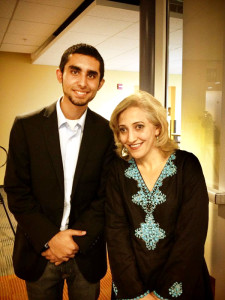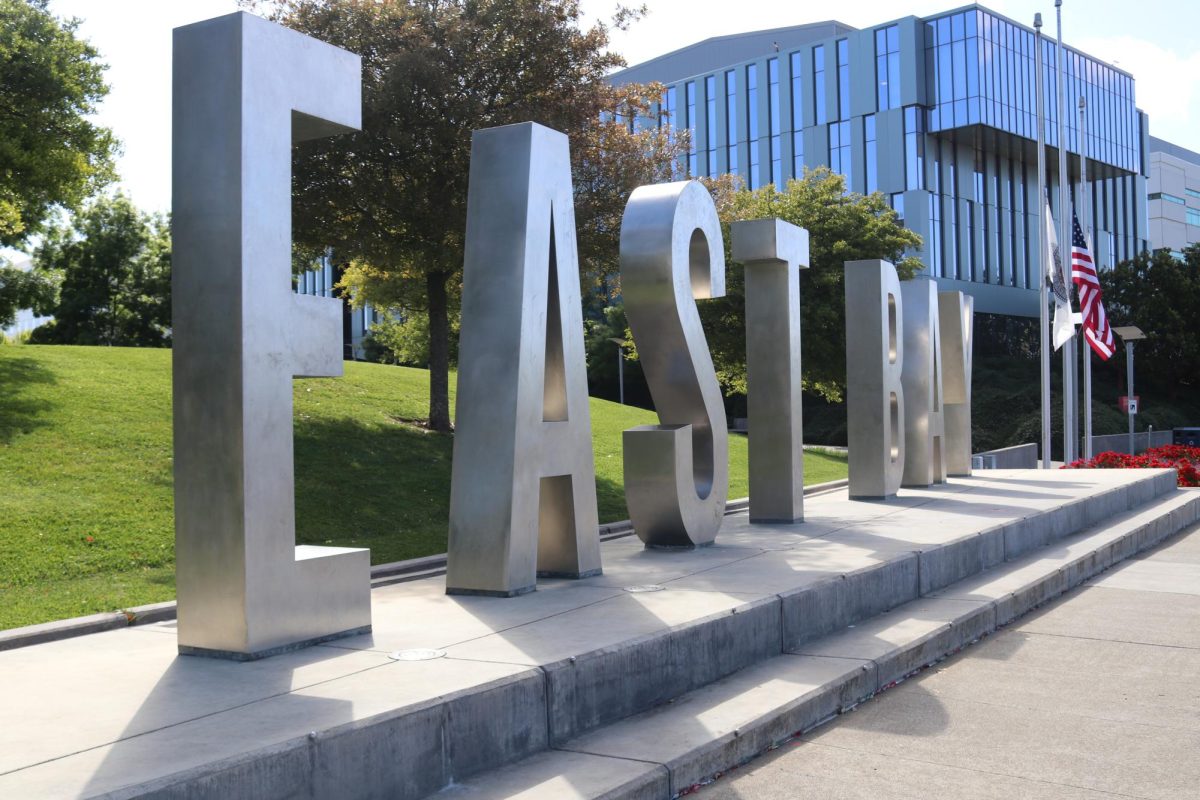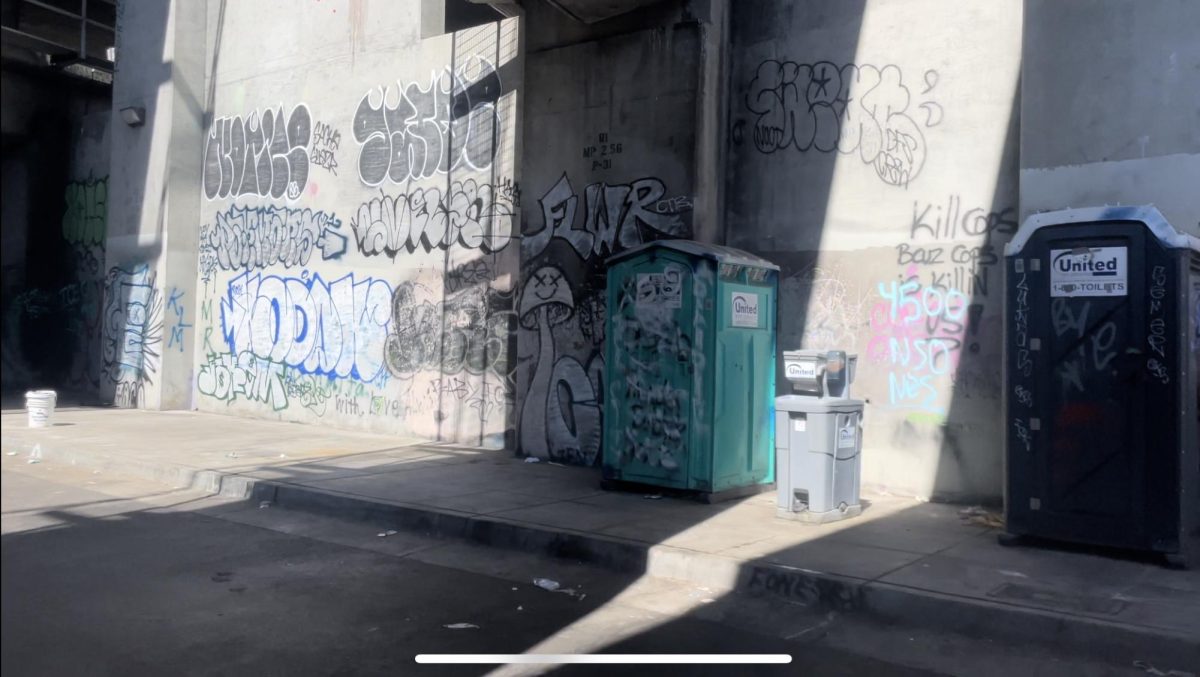
Student Association, (left) next to
Fariba Nawa (right).
Afghan journalist and author of bestseller “Opium Nation,” Fariba Nawa, shed light last Thursday at CSU East Bay on the booming illegal opium trade in Afghanistan and how it destroys the life of ordinary people.
According to Nawa, the human rights situation in Afghanistan has deteriorated in response to efforts made by the Afghan government to curb the ongoing boom in the illegal opium trade.
Afghanistan is the largest producer of opium in the world — as much as 90 percent of all opium comes from there – and Nawa encouraged attendees Thursday evening to educate themselves on this controversial issue.
Nawa is a freelance journalist who was born in Herat, Afghanistan in 1973, until she fled with her family to the United States during the Soviet invasion in the 1980s. She finished her schooling in Union City, Calif., and received her masters from New York University in 2004. CSUEB’s Model UN club and the Afghan Student Association hosted the event in recognition of International Human Rights Day.
About 20 students were in attendance Thursday at the New University Union Bay View Room, where students listened to the acclaimed journalist speak with great passion and fervor for the change she wishes to see happen in the opium trade wars and for women in Afghanistan.
According to Nawa, Afghanistan has been the greatest illicit opium producer in the entire world since U.S. occupation started in 2001. The ruling Taliban government previously instituted a ban on poppy cultivation that dramatically decreased the amount of opium production inside Afghanistan. This was done under the guise of opium production being “un-Islamic,” the Taliban government stated.
Nawa claims the real reason was because the opium market was oversaturated and they needed to artificially boost the value of opium. The opium trade in Afghanistan amounts to about $2.4 billion, which is almost 15 percent of country’s gross domestic product (GDP), according to the most recent report from the United Nations Office on Drugs and Crime.
Based on the report, there has been more opium poppy cultivation in each of the past four growing seasons between 2004 to 2007 than in any one year during Taliban rule. More land is now used for opium in Afghanistan than land is used for coca plant cultivation (utilized for the production of cocaine) in Latin America.
The Afghan government has stepped up efforts to eradicate poppy farms in exchange for seeds to grow legal crops, but poppy production is the only profitable business in Afghanistan. Growing wheat or other legal crops does not provide families with enough money to survive.
Many poor farmers take loans from drug traffickers to grow their harvest. The system of eradication leaves them in debt.
“Solving the drug trade requires a multi-faceted approach that includes security, alternative crops, roads to transport those crops to other markets, tackling the corrupt government officials who are involved in the trade and accepting that it will take decades for Afghanistan to wean itself from the drug trade,” said Nawa.
In order to pay off their debts, according to Nawa, families have to sell their children into slavery and forced marriage. Many young women, who find themselves forced into marriage with men much older than they are, perform self-immolation. “This is women’s way of protesting, saying they will no longer be owned and controlled. They’d rather die,” she said.
More often than not, drug traffickers will even kidnap the young daughters of men who have not paid their debts.
A couple of Afghan students, one of whom said he lived in the region where these incidents allegedly occur, were not convinced this was a common issue in Afghanistan. According to one student, who wished to remain anonymous, while these situations do occur, “they are very rare.” He also said forced marriage is essentially the same as arranged marriage and is acceptable in Afghan culture.
Nawa rebuffed his response and emphasized it is an important and critical issue, one that is perhaps not talked about in mainstream media outlets. She said the practice of forced marriage was not part of Afghan culture or Islamic beliefs, which stipulates women must consent to marriage otherwise it is invalid.
“I think they had a hard time accepting certain truths about Afghanistan which are painful,” Nawa told The Pioneer. “One of the men suggested that forced marriage is part of the culture but I suggested that even if it was, it must be changed because it goes against the basic principles of human rights.”
Shuaib Amiri, president of the Afghan Student Association, said he was thankful for Nawa and the Model UN club for bringing “awareness of the situation” in Afghanistan.
In the end, Nawa commented to attendees her great appreciation for those who came to hear her speech, and why this particular event at CSUEB was special.
“I’ve done dozens of events in my career and I’ve learned to connect and speak to whoever shows up,” said Nawa. “I was pleased at the attendance – the room eventually filled up – and a few of the audience members were in tears because they were moved by the true stories I was sharing. I even appreciated the critics who spoke because they diversified the discussion.”

















